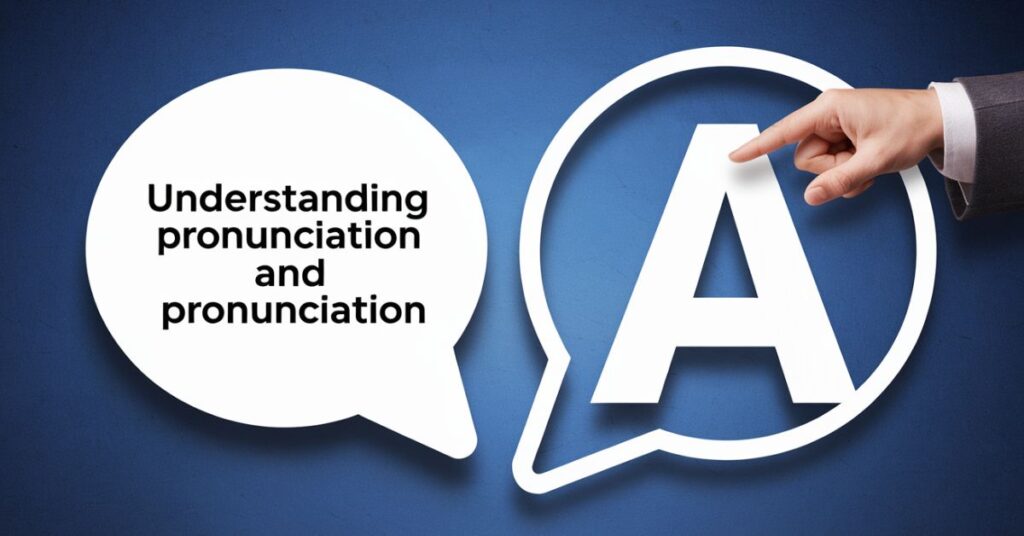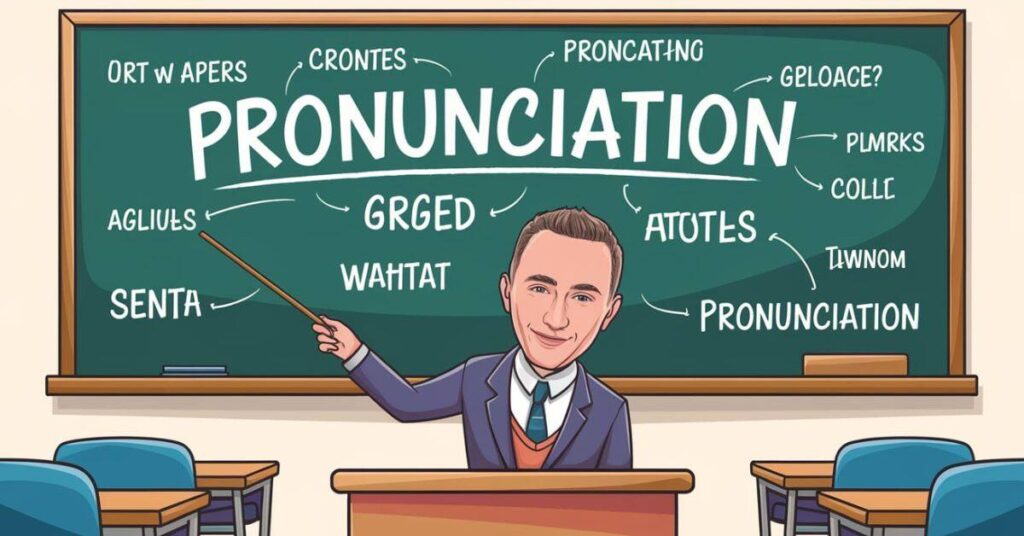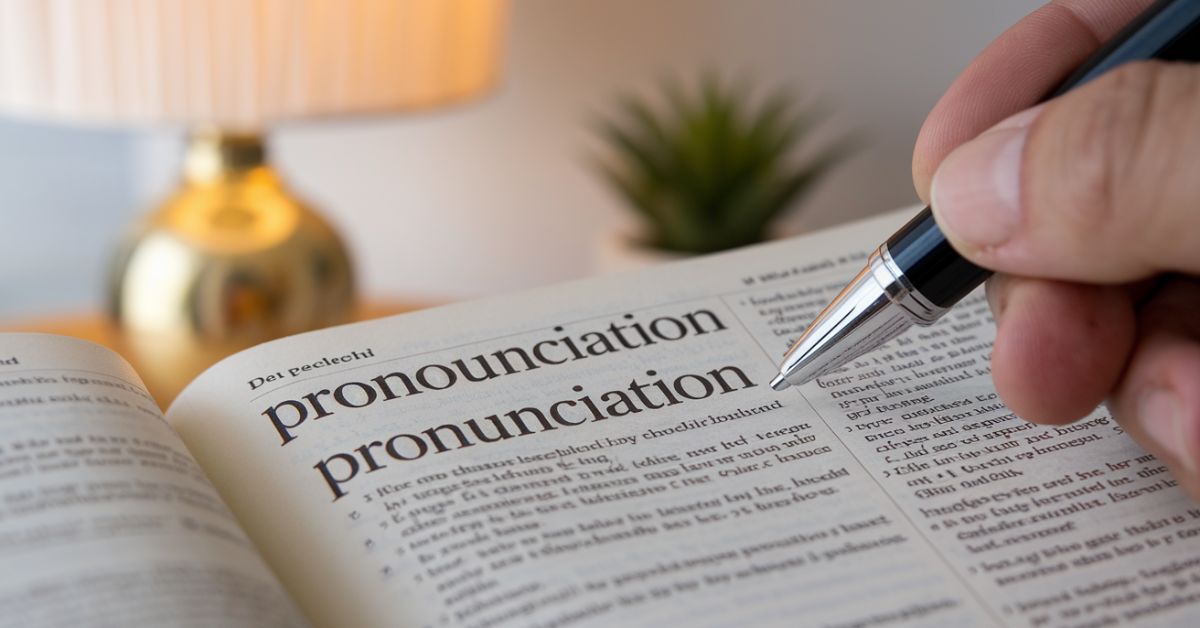Many people often confuse the words “pronounciation” and “pronunciation.” “Pronounciation” is a common misspelling of the correct term “pronunciation.” The proper word refers to the way a word is spoken or pronounced.
Have you ever wondered if you’re saying it right? Most people mistakenly use “pronounciation” without realizing it’s wrong. It’s a simple error that can easily be corrected with a little attention to detail.
Knowing the correct term, “pronunciation,” is important for clear speech and effective communication. Using the right word will help you sound more confident. It’s essential for language learning and teaching as well.
Understanding Pronounciation and Pronunciation

The words “pronounciation” and “pronunciation” are often used interchangeably, but only one of them is correct. The reason many people confuse them is because of the word “pronounce.” You might expect that the noun form of “pronounce” would be “pronounciation,” but that’s not the case. “Pronounciation” is simply a common misspelling, and this error has been repeated enough that it’s become a widely recognized confusion in both speech and writing.
The Importance of Correct Pronunciation
When it comes to language learning and communication clarity, proper pronunciation is crucial. Mispronunciations can lead to misunderstandings and make it harder for people to follow what you’re saying. This is especially true when it comes to non-native speakers or those learning new vocabulary. To avoid pronunciation errors, it’s essential to understand how to pronounce words correctly and use the right terms in speech and writing.
Pronounciation: Definition and Usage
Let’s first take a closer look at the term “pronounciation.” As we mentioned, this is a common misspelling of the correct word “pronunciation.” Many people mistakenly add an extra “i” to the word, which leads to the incorrect version.
Why “Pronounciation” is Incorrect
“Pronounciation” doesn’t appear in any standard dictionary. It’s simply an error that stems from trying to form a noun from the verb “pronounce.” If we were to follow the same logic as other English words, we might think the noun should be “pronounciation.” However, English doesn’t always follow such predictable patterns, and in this case, it drops the “o” to form “pronunciation.”
In terms of word stress and intonation, the error here might not be immediately noticeable in speech, but in writing, using “pronounciation” undermines the clarity and accuracy of your communication.
5 Synonyms of “Pronunciation”
To further explore this concept, let’s look at five synonyms of “pronunciation” that help us understand its meaning:
- Enunciation: The act of pronouncing words clearly.
- Articulation: How clearly and distinctly words are spoken.
- Diction: The choice and use of words and phrases in speech.
- Accent: The way words are pronounced depending on the region or language background.
- Inflection: The variation in pitch or tone in speech that can affect meaning.
Each of these words offers a unique angle on correct pronunciation and speech clarity, but none of them replace “pronunciation” in spelling or usage.
Pronunciation: Definition and Usage
Now, let’s turn to the correct term: pronunciation. This is the accepted standard and accurate way of describing how a word is spoken. It includes elements like word sounds, intonation, word stress, and how syllables are emphasized.
Correct Usage of “Pronunciation”

When discussing the way a word is spoken, pronunciation is the proper term. Whether you’re giving a pronunciation guide in language teaching or discussing word pronunciation in language learning, the focus is on the way sounds are formed and delivered in speech. For example, in British English pronunciation, words like “schedule” are pronounced differently compared to American English pronunciation. These subtle differences in pronunciation rules highlight how important it is to get the term right.
Additionally, when working on vocabulary learning or improving phonetic pronunciation, understanding pronunciation rules is key. Whether you’re aiming for phonetic accuracy or just striving for clearer speech in everyday conversations, using the correct term “pronunciation” helps ensure you’re speaking with clarity.
5 Synonyms of “Pronunciation”
Here are five useful synonyms for pronunciation that can expand your vocabulary:
- Speech: The expression of thoughts through spoken words.
- Delivery: The manner in which something is spoken or presented.
- Accentuation: The emphasis placed on certain syllables or words.
- Phonetics: The study of the sounds of speech.
- Voice: The quality and tone of sound produced during speech.
These words also relate to how we speak but should be used in their specific contexts rather than as replacements for “pronunciation.”
Side-by-Side Comparison of Pronounciation vs Pronunciation
To make things even clearer, here’s a quick side-by-side comparison of “pronounciation” and “pronunciation”:
| Aspect | Pronounciation | Pronunciation |
|---|---|---|
| Correctness | Incorrect term | The correct form |
| Usage | Often a misspelling | Used in both speech and writing |
| Common Mistake | Yes, a common error | No, accepted standard |
| Part of Speech | Incorrect noun form | Correct noun form |
As you can see, “pronounciation” is not a real word, while “pronunciation” is the accepted standard in English.
Everyday Usage Examples: Pronounciation vs Pronunciation
The following examples will show how the two terms can be used in everyday conversations:
Pronounciation (Incorrect)
- “The teacher praised the student’s pronounciation during the lesson.”
- “I need to work on my French pronounciation before the trip.”
- “The podcast host’s clear pronounciation made the content easy to follow.”
- “Her pronounciation of technical terms was particularly impressive.”
- “Good pronounciation is key to being understood by native speakers.”
- “He took a course to improve his pronounciation in English.”
Pronunciation (Correct)
- “The teacher praised the student’s pronunciation during the lesson.”
- “I need to work on my French pronunciation before the trip.”
- “The podcast host’s clear pronunciation made the content easy to follow.”
- “Her pronunciation of technical terms was particularly impressive.”
- “Good pronunciation is key to being understood by native speakers.”
- “He took a course to improve his pronunciation in English.”
By using “pronunciation” correctly in your everyday speech and writing, you can avoid common language mistakes and ensure clear communication.
Frequently Asked Questions:
Is it spelt pronunciation or pronounciation?
The correct spelling is pronunciation. “Pronounciation” is a misspelling and should be avoided in both speech and writing.
Why pronunciation not pronounciation?
“Pronounciation” is incorrect because the English language doesn’t follow a simple rule of adding “i” to the verb “pronounce.” The proper noun form is pronunciation, which has been the accepted term for centuries.
Which pronunciation is correct, British or American?
Both British English pronunciation and American English pronunciation are correct, though they may differ in some cases (like the pronunciation of “schedule” or “advertisement”). However, pronunciation itself remains the same in both dialects.
Conclusion:
Pronounciation is a common mistake, but the correct term is pronunciation. This error happens because many people try to match the spelling to the word “pronounce.” However, English doesn’t always follow simple rules like that. The word “pronunciation” is the accepted and proper way to describe how a word is spoken.
Using the correct term is important for clear and effective communication. Whether you are learning a new language or teaching others, saying “pronunciation” instead of “pronounciation” helps you sound more accurate. Paying attention to small details like this shows your understanding of language and helps avoid misunderstandings. Always use “pronunciation” to make your speech and writing more clear and correct.
With 5 years of experience in grammar, I, Admin, deliver accurate, clear, and reliable content. My expertise ensures top-quality insights in this niche.

